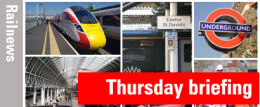Posted 21st October 2021 | 5 Comments
FirstGroup's new open access services unveiled

FirstGroup claims promising start for Lumo
Bookings for FirstGroup's new open access services on the East Coast Main Line are 'above expectations', according to First, as the first Lumo train runs between London and Edinburgh. Today's return journey is a special preview for the media and other invited guests, with public services beginning on Monday. Fares in the single-class trains start at £14.30, and First has promised that six out of ten fares will be £30 or less. The timetable is intended to compete directly with the airlines, and trains will call at Morpeth, Newcastle and Stevenage, with up to 10 services running daily by early next year. Lumo managing director Helen Wylde said: ‘The support we have received for Lumo has been fantastic. We have always said we intend to reimagine rail travel and we are glad people are giving us a chance. Tickets are selling well beyond expectations, and we have had great feedback about our commitment to offering a different kind of rail company. However, rest assured we are not complacent and understand we must earn travellers’ trust in the Lumo promise.’
Reader Comments:
Views expressed in submitted comments are that of the author, and not necessarily shared by Railnews.

Steve Alston, Bridgewater, Haus.
Open access is plain abstraction of pre-existing state run railway money and should be stopped. The fact that some operators have been refused the right to trade based on this, was reason enough for the DfT to have rejected this lot's bid. I would be interested to see how it was awarded in relation to how other OA operators were rejected.
Besides, the original plan clearly stated a non-stop service and the addition of Morpeth, Stevenage etc will add negligible 'new' passenger numbers.
Michael Breslin, Liverpool
My only objection to Open Access is that the applicants have always been established franchise/contract holders or their subsidiaries and not newcomers coming in to provide real competition.
[Not quite. When Grand Central began it was a new organisation led by Ian Yeowart. It was later taken over by Arriva, though.--Ed.]
david c smith, Bletchley
Yes , I don't deny that Open Access is not a universal panacea, but could be the answer for suitable routes and services. At the same time, localised publicly owned and run operations seem to be the best way for captive market natural monopolies, ( mainly commuter and short distance ), through local direct democracy. I'm simply advocating "horses for courses" rather than "one size fits all".
One problem for the nationalised BR was "Parliamentary accountability", which in practice was too remote , long winded and limited by available time resources. Local, directly elected transport commissioners might have a much better chance of representing passengers.
Re.the ECML, it seems to me that it suffered from the flawed Franchising version of privatisation, which I've never supported myself.
I guess the two different models I'm putting forward are rather like the comparison between local bus operations and National Express coaches.
[I'm afraid I don't warm to your last comparison, David. Apart from London and a few other cities, local buses are entirely private sector, and unregulated. Neither are they necessarily 'natural monopolies'. On the other hand, if NX doesn't want to run a coach between London and Plymouth until after midday then there won't be one. If you want to ensure reasonable rail services all day you will have to introduce regulation and public subsidies for those journeys which don't wash their faces. Sounds more and more like a franchise! I remain convinced that open access passenger services only work when they are not a core foundation of the timetable, with the possible exception of specialist high speed operations like Eurostar (although this all but disappeared during Covid, proving the esssentially fragile natore of OA).--Ed.]
david c smith, Bletchley
Several years ago, the Competion and Monopolies Authority suggested a system for general Open Access to replace Franchising, in which operators would bid for "bundles of paths", competing with one another over a given route. Of course, this was suggested only for suitable routes, given a framework of subsidies and charges that may be applied for wider reasons ( environmental , health & safety , etc.).
Currently, the Italian high speed lines host two competing operators, whilst three different operators have been licensed to compete on the Spanish high speed lines.
Any lessons for us ?
[Yes -- ignore the Competition and Markets Authority. Have we not had enough of the 'free market will decide', since 1995? Railways need a core operator to provide basic services. Adding one or two OAs cherry picking the market at certain times of day may be useful, but only maybe. Let's not forget that the ECML has seen the downfall of three franchises. It is surely no coincidence that the same route also has two (now three) OA operators. OA on high speed lines is a special case, I would suggest, given that there is also a supporting classic line in each case.--Ed.]
David Woodcock, Burntwood
Well Done First Group.
I wish them well with their new LUMO Rail service.
There's a huge number of people who would use rail if Fares were affordable.
Hope they are able to expand services to other areas (Birmingham).
Best wishes from Dave.